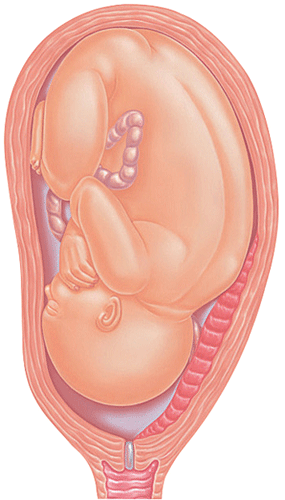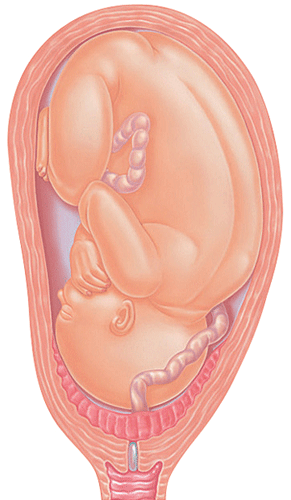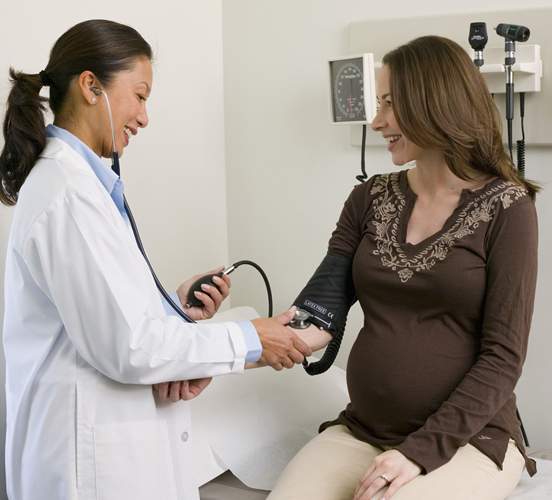Placenta previa
Placenta previa means a
low-lying placenta, which occurs when the placenta is either partially
covering (partial or minor), or completely covering (complete or major),
the cervix. In complete placenta previa, the baby cannot be born
vaginally. Complete placenta previa poses a high risk of heavy bleeding,
either in the later stages of pregnancy or during the actual labor,
which is treated as an emergency. If a low-lying placenta is detected at
your 20-week ultrasound, you may be offered a scan in late pregnancy;
this is because the placenta may “move up” as the uterus grows, and by
about 34 weeks may no longer be low. If you have placenta previa,
particularly complete placenta previa, most hospitals admit you for bed
rest in the last days of pregnancy until the birth so that if you bleed
heavily, you can be treated immediately.
Partial or “low-lying”:
Only part of the placenta is covering the cervix, which means that a natural vaginal delivery may be possible.

Complete:
The placenta is directly above the cervix, which means the baby will need to be delivered by cesarean section.

NOTE
Advances in prenatal care over the past few decades mean that even the most serious conditions can be dealt with successfully
NOTE
Pregnancy can be challenging. Staying focused on the arrival of your baby can help you to stay positive
Preeclampsia Pregnancy-induced hypertension
Preeclampsia is a
condition that affects around 10 percent of women during their pregnancy
(or, rarely, in the first 72 hours after the delivery). The cause is
still unknown, although it is thought that it may be caused by a
malfunction of the placenta.
| Q: |
What are the symptoms?
|
| A: |
There are varying degrees of preeclampsia, from your blood
pressure rising a little bit toward the end of your pregnancy and a
small amount of protein detected in your urine (which affects about 1 in
10 pregnant women), to a large rise in your blood pressure and a
considerable amount of protein found in your urine (affecting about 1 in
50 pregnant women). Your blood pressure and urine will be checked (and
the size of your baby measured) at your prenatal appointments to look
for signs of preeclampsia and you will be referred to the hospital if
necessary. Sudden swelling, headaches, pain under your ribs, and visual
disturbances also indicate preeclampsia and you should contact your
midwife or doctor right away if you experience any of these.
|
| Q: |
What can be done?
|
| A: |
If you have the milder form of preeclampsia, this will only
require your blood pressure and urine being tested a little more
frequently—perhaps weekly. However, the more serious form will require
you to go to the hospital, where you and your baby will be monitored and
given medication to lower your blood pressure. This is because if you
are left untreated, it could develop into eclampsia, which is a very
serious condition in which you may suffer convulsions, and your and your
baby's lives could be in danger. Induction of labor
is sometimes recommended if the condition seems to be worsening or if
your blood pressure gets too high. Once your baby is born and the
pregnancy is over, the preeclampsia goes away.
|
| Q: |
Who is at risk?
|
| A: |
Women are at a greater risk of preeclampsia if they have had the
condition before; are over 40 years old; have a body mass index (BMI)
over 35; have a family history of preeclampsia (mother or sister); had
high blood pressure, diabetes, or kidney disease before the pregnancy;
or are carrying more than one baby.
|
Prenatal monitoring:
Regular monitoring of blood pressure at prenatal appointments helps to detect women at risk of preeclampsia.

Myths and misconceptions Is it true that…
| Q: |
All women love being pregnant?
|
| A: |
That
pregnancy makes women completely happy is a myth. While being pregnant
and starting a family can cause tremendous joy, it is also quite an
exhausting and overwhelming experience, with major biological,
psychological, and social changes to cope with. Everyone's pregnancy is different—you'll probably find that it's a great experience but can be difficult.
|
| Q: |
My vivid baby dreams are a bad sign?
|
| A: |
Pregnant women often have strange, vivid dreams, but this is completely normal.
Experts attribute the vividness of these dreams to hormones, as well as
all the emotional and physical changes you're going through. The vivid
dreams may be a way for your subconscious to deal with all the hopes and
fears you may have about pregnancy and impending motherhood.
|
| Q: |
Morning sickness will starve my baby?
|
| A: |
Morning
sickness is one of the most common pregnancy symptoms, and is believed
to be caused by pregnancy hormones. It's easy to panic if you're
throwing up every morning and you don't seem to be gaining weight, but
try not to worry—you won't really start to gain weight until later in
your pregnancy. As long as you were healthy before you became pregnant,
your baby will be more than adequately nourished.
However, it is possible that severe pregnancy sickness (hyperemesis
gravidarum) can compromise your baby, so tell your obstetrician or
midwife if you aren't able to keep any liquids or foods down.
|